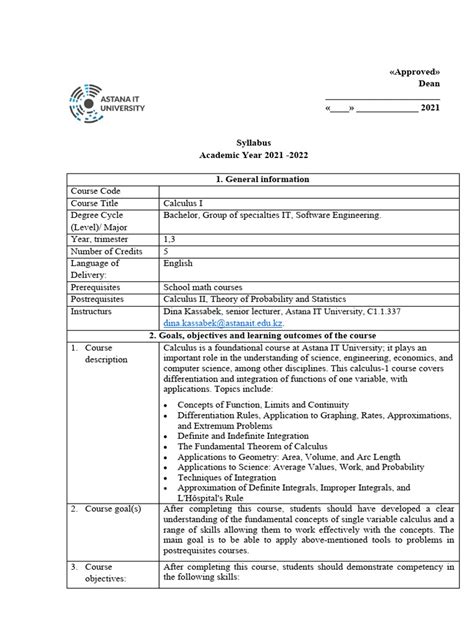Course Overview:

Calculus I is an engaging introduction to the fundamental concepts of differential and integral calculus. This comprehensive syllabus provides an in-depth exploration of the course content, learning objectives, grading policies, and resources to support your success.
Course Objectives:
Upon successful completion of Calculus I, students will be able to:
- Understand and apply limits, continuity, and derivatives
- Sketch the graphs of functions using derivatives
- Find the extrema and asymptotes of functions
- Integrate functions using various techniques
- Apply integration to solve problems in geometry, physics, and other disciplines
Textbook:
- Calculus: Early Transcendentals (8th or 9th Edition) by James Stewart
Course Outline:
Module 1: Limits and Continuity
- Limits of functions
- Continuity and discontinuity
- The Intermediate Value Theorem
- Asymptotes and limits at infinity
Module 2: Derivatives
- Definition of the derivative
- Differentiation rules
- Applications of differentiation (e.g., tangent lines, velocity)
- Related rates problems
Module 3: Applications of Derivatives
- Maxima and minima
- Inflection points
- Curve sketching
- Optimization problems
Module 4: Integrals
- Antiderivatives and indefinite integrals
- Definite integrals and the Fundamental Theorem of Calculus
- Techniques of integration (e.g., u-substitution, integration by parts)
Module 5: Applications of Integrals
- Area and volume calculations
- Work and energy
- Probability and statistics
Grading Policies:
- Homework Assignments (20%)
- Quizzes (20%)
- Midterm Exam (30%)
- Final Exam (30%)
Course Resources:
- Instructor’s office hours (see course schedule for details)
- Online discussion board (available on Canvas)
- Supplemental materials (provided by the instructor)
Common Mistakes to Avoid:
- Not practicing differentiation and integration techniques regularly
- Trying to memorize formulas without understanding the concepts behind them
- Ignoring dimensional analysis in integration problems
- Assuming that a function is differentiable or integrable without verifying first
Tips for Success:
- Attend lectures and take thorough notes
- Complete homework assignments and seek help when needed
- Practice differentiation and integration techniques regularly
- Use online resources and study groups to reinforce your understanding
- Ask questions and seek feedback from your instructor and peers
Applications of Calculus:
Calculus is a powerful tool that has countless applications in various fields, including:
- Engineering (e.g., design, construction)
- Physics (e.g., motion, forces)
- Biology (e.g., growth models, population dynamics)
- Economics (e.g., optimization, risk assessment)
